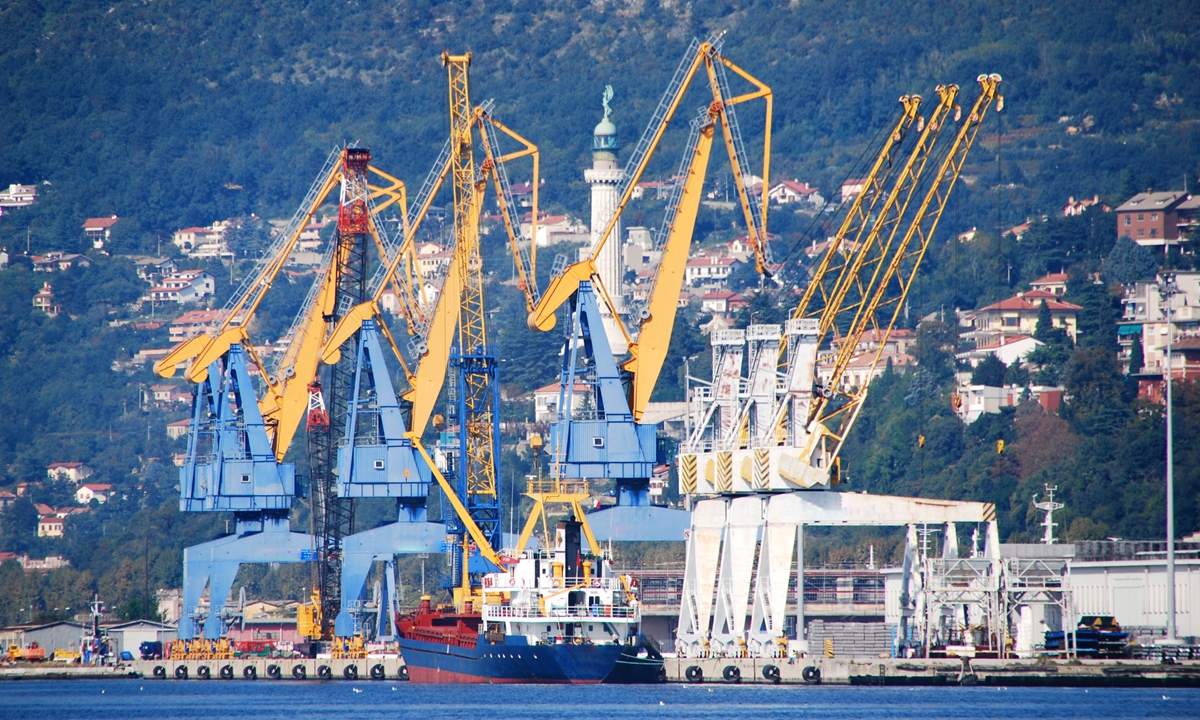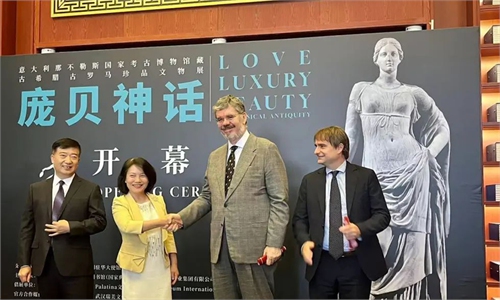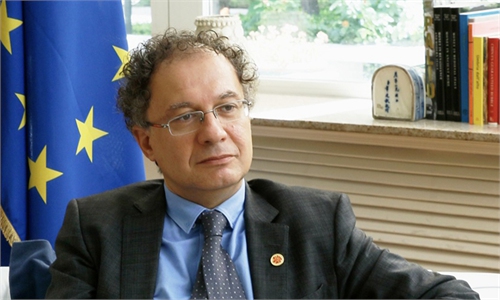China spearheads the growth of most innovative cooperation formats

Port of Trieste, Italy Photo: VCG
Editor's Note:This year marks the 10th anniversary of the Belt and Road Initiative (BRI) proposed by Chinese President Xi Jinping. Through the lens of foreign pundits, we take a look at 10 years of the BRI - how it achieves win-win cooperation between China and participating countries of the BRI and how it has given the people of these countries a sense of fulfillment.
Vito Petrocelli (Petrocelli), former head of the Italian Senate Foreign Affairs Committee and President of the Istituto Italia BRICS, attended the third Belt and Road Forum for International Cooperation held in Beijing on October 17 and 18. In an interview with Global Times (GT) reporter Wang Wenwen, Petrocelli shared his feelings of being present at the forum, and Italy's stakes in participating in this initiative.
This is the 19th piece of the series.
GT: You attended the second Belt and Road Forum for International Cooperation, and you also attend the third forum this year. How did you feel at this year's forum?
Petrocelli: I was present at the forum here in Beijing for the thematic forum on people-to-people bonds. I discussed concrete topics including "Silk Road for connecting different civilizations," "Silk Road for promoting common development," and "Silk Road for maintaining continuous peace."
GT: Much attention has been given to Italy's decision to quit the BRI. You once advocated for Italy's active participation in the BRI. Do you worry about Italy's potential withdrawal, and if so why?
Petrocelli: Italian participation in the BRI had several positive consequences. The first and most important is that cooperation between the two countries in the economic, cultural, political and social fields has become a "benchmark" within the European Union, confirming the need to develop the comprehensive strategic partnership between the two sides.
Data show that trade volume between China and Italy increased for three consecutive years in 2022. Bilateral trade volume reached $77.9 billion in 2022, up 5.4 percent year on year. Italian exports to China increased by 58 percent in the first five months of 2023. Italy and China have highly complementary economies. Their bilateral relations, especially in the economic and trade sectors, have taken a great leap forward.
It will be difficult to maintain these excellent results if Italy withdraws from the BRI.
GT: What factors are affecting BRI cooperation between China and Italy and Europe? Will other European BRI participants be affected by Italy's withdrawal?
Petrocelli: The international climate of a new cold war is negatively affecting the work done by Italy, China and the EU. The US is increasingly interfering in the internal affairs of allied countries, especially in the affairs of Italy and Germany.
Italy's withdrawal will leave an area of opportunities for other European countries participating in the BRI.
GT: The US and some other countries have outlined plans for a rail and shipping corridor that would connect India with the Middle East and ultimately Europe, which is considered as a counterweight to the BRI. What do you think of this plan?
Petrocelli: This plan has already received negative opinions from several countries. I wonder how it is possible to think of a counterweight to the BRI, a project that involves more than 150 countries and 30 international organizations.
GT: As president of Istituto Italia BRICS, you are an advocate for BRICS expansion. What is Italy's stake in BRICS expansion? How do you analyze the trend of BRICS expansion?
Petrocelli: The BRICS countries met in August in Johannesburg and decided to expand the format to include six more nations: Saudi Arabia, Argentina, Egypt, United Arab Emirates, Ethiopia and Iran. The expansion represents the true transformation of BRICS from a group of emerging economies to a mouthpiece for the Global South.
The BRICS group is not a political or military alliance, such as the European Union or NATO. It is a group of countries that have some common goals and mainly foster self-determination, mutually beneficial cooperation, balanced development and ultimate liberation from Western neocolonialism.
Italy fully supports the expansion of BRICS because it has historically strong cultural, economic and trade relations with all six countries that will join from January 2024. The United Arab Emirates is the 22nd recipient country for Italian exports in 2022. Saudi Arabia is the 21st country of origin for Italian imports, ahead of Slovenia, South Korea and Japan. Argentina is the country with the largest community of people of Italian origin in the world. Therefore, Argentina and Italy are very closely linked for cultural and commercial reasons. With Iran, Egypt and Ethiopia we have always maintained the best relations among EU countries.
GT: How should the West cope with this trend? In which areas do you think Italy and BRICS can enhance cooperation?
Petrocelli: The collective West, with some exceptions, continues to see itself as indispensable to collective development. But for at least 15 years this has not been the case. We can see this by looking at China's huge growth, which has lifted hundreds millions of people out of poverty in just a few years, spearheaded the growth of the most innovative cooperation formats such as BRICS and SCO, and launched the largest development cooperation initiative, namely the Belt and Road.
Italy can play an important role in BRICS-West relations, especially within the G7. In 2022, Italy exported 247 billion euros and imported 180 billion euros with the G7 countries. In the same year, Italy exported 34.5 billion euros and imported 103 billion euros with BRICS. Therefore, Prime Minister Meloni should ask herself whether at this delicate geopolitical stage it is convenient for Italy to limit its relations with BRICS, as the US is basically asking Italy about the renewal of the MOU on the Belt and Road. In my opinion, the answer is negative: Italy was the only country in the G7 to have signed a memorandum with China on the Belt and Road. Italy is geographically and culturally a border country, between the East and West, between the global North and South, but unfortunately it risks losing this role because of its recent political and commercial choices.


